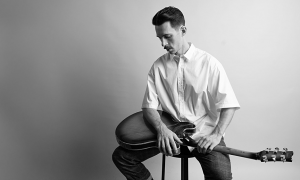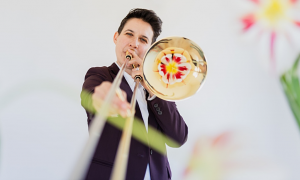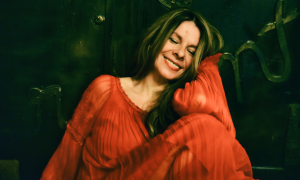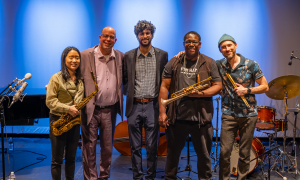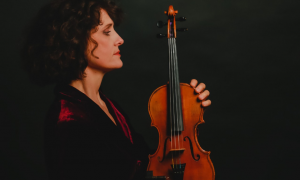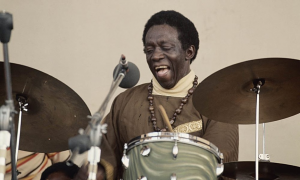Home » Jazz Articles » Take Five With... » Take Five With Mandolinist Joe Brent
Take Five With Mandolinist Joe Brent

Courtesy Emma Mead
Meet Joe Brent
Called, "one of the truly exceptional musicians of his generation," a mandolinist about whom it has been said, "there has never been a mandolinist with greater technical skills," and a composer whose music, "touches and communicates the essence of what it means to be an alive, feeling human being," Joe Brent has forged a career as both instrumentalist and composer with unparalleled fluency across multiple genres. HIs latest album Strum features his chamber jazz trio 9 Horses. Joe is the founder and producer of Adhyaropa Records.Instruments:
My primary instrument is mandolin and electric mandolin, but I started on violin and also play guitar and piano. On Strum I really explored combinations of plucked string sounds from around the world, with lyre, bağlama, vihuela, banjo, cümbüş, and others. That's also me playing the musical saw, synths, and the odd percussion.Teachers and/or influences?
I studied violin as a kid with Andrew Galos, who played in the NBC Philharmonic under Toscanini. I hadn't really studied mandolin with a proper teacher until I went to Italy to study with Carlo Aonzo. At Berklee I took a few lessons from Matt Glaser, Mick Goodrick, and George Garzone.As a kid I was a Jimi Hendrix fanatic. When I was younger and doing a lot of transcribing, Lee Morgan was my favorite, and eventually I just fell in love with Eric Dolphy's approach, the way he would group varying densities in his improvisations; first a cascade of sounds, then a singing melody, then some bent swinging... He really kept your ear on high alert the whole time. What you play doesn't matter any more than whether what you're playing is interesting or surprising. Dolphy taught me that.
But I'm just as influenced by players like Richard Thompson—you can really hear his influence on the album's last track, 'The House that Ate Myself,' where I'm doing a little hybrid picking pattern on mandolin. I love a guitarist that can create an interesting part on its own but that also serves the song. Elliott Smith also comes to mind, and of course Hendrix. Later in the same song where I get to my electric mandolin solo, it's probably tempting to compare it to guitarists but in fast tempos I'm really trying to phrase the way a pianist like Chick Corea would. On an earlier tune, 'Jenny-Pop Nettle Eater,' I'm playing a duo solo with the incredible drummer John Hadfield, and listening back I can hear how much John Scofield I used to listen to.
With 9 Horses, I'm always trying to create improvisations that contrast Sara Caswell's unique style, so you could say she's an influence. She really uses the vocal nature of the violin splendidly. There's nothing choppy or angular in her playing, just those gorgeous, long, melodic phrases. You can take a Sara solo out of context, reharmonize it, and wind up with a completely different tune that's probably just as interesting as the one she's improvising over. So, I usually try to go the other way to offset her, with angularity, repetition, and dissonance. 'Jenny-Pop' is a good example of this: my solo is jagged and spacious and the interplay with me and John is almost combative, whereas Sara's solo later in the tune is sweeping and romantic. I try to write the music to create opportunities for us to contrast each other like that.
As a composer, I'm coming from the late Mingus approach of writing pieces with contrasting sections and lots of textural variety. My music is often described as "cinematic," and I don't mind this at all; in fact I'm really influenced by film music and orchestral composers. There are even a few film music Easter eggs in Strum—on 'Jenny-Pop,' the celesta runs are lifted right from John Williams, and the vocal arrangement Kate Steinberg did was based on my prompt, "Make it sound like Jerry Goldsmith's Secret of Nimh score."
I knew I wanted to be a musician when...
I was four years old and saw Itzhak Perlman on tv playing Tchaikovsky and begged my parents for a violin! Then I heard Hendrix and it was the only thing I wanted to listen to. Then I heard Mahler and I knew I wanted to paint on big canvases.Your sound and approach to music.
I think of myself as a composer first, but my definition of "composer" is a bit more fluid than other peoples.' For me, composition is collaboration, and the two concepts are impossible to separate. I write 9 Horses tunes sort of part of the way to completion, and then as soon as possible I bring it to Sara and Andrew to flesh it out, because their agency in the compositional process is load-bearing. For me, having their individual voices and ideas represented in everything we do makes the finished product much more interesting than what I would have come up with on my own, even if their ideas aren't what I had in mind or even cancel out my original idea. Coming to music without ego, prioritizing the making of the best and truest music you can, is how I define the compositional process. It also makes it much more fun to play, even though it's still very difficult, complex music. Our improvisations naturally spring from the compositions.I try to think of our music the way the writers of I Love Lucy used to write episodes: first, they would start with an absurd or funny situation for Lucy to find herself in, and then write backwards so that she winds up there. I think The Simpsons does this too. Similarly, I think, "If I'm the audience, what's a cool thing I'd like to hear the band do, or Sara do, or Joe or Andrew?" At that point reverse-engineering the music to accommodate that is a lot easier for me as a composer than to start with a blank page.
Your teaching approach
In terms of pure instrumental technique, I try to remind my students that instruments like mandolins are designed to push sound outwards, away from the player, and they're usually quite good at that; the problem is that the ideal sound of the instrument exists several feet in front of the player, not in the player's direct field of hearing. Thus the tendency is to overdrive the sound, because you're not getting the full range of color and projection with your ears directly above the instrument. So I spend a lot of time with my students getting them to relax their posture and playing mechanics and trust the instrument.But 9 Horses' main activity is in academic residencies at colleges, where we give workshops and masterclasses and occasionally invite students and faculty to perform with us in music we create for the occasion. In this setting, my teaching approach is much more broad and encompassing; what is the best and most responsible way to prepare a student in college, on the cusp of their music career? You can expose them to the tools they'll need that colleges don't always have the resources to give them, like recording technology or the intricacies of the music business. But also you have to equip them with a mindset to succeed. We tell them things like: having 20 people that come to all your gigs is more valuable than having 20,000 Instagram followers. Being good at responding to emails and texts in a timely fashion makes you more likely to receive another email or text. It's not enough to be a good player, you also have to be someone that other musicians enjoy playing with. Show up to your friends' gigs, and they'll show up to yours, and you can create a rising tide of artists that lifts everyone's boat. This is the kind of advice that we've found stays with students long after any specific direction in their instrumental technique.
Your dream band
I'm already playing in my dream band, 9 Horses with Sara Caswell and Andrew Ryan, plus lots and lots of collaborators. There are 25 guest musicians on Strum! People like John Hadfield, Glenn Zaleski, Samuel Torres, Michael Bellar, Emily Hope Price... so many more. On the last album we had Nadje Noordhuis, Jared Schonig, and more than 30 more. This last one was an intimate affair by comparison! We're open to collaborating with anyone, from any genre, and I think we'd have something interesting to share with anyone.Road story: Your best or worst experience
There are so many—the first one that pops into mind is flying into Santiago, Chile on the day the miners were rescued, back in 2010. We got to the hotel and sat at the bar with strangers for hours drinking and cheering every time they pulled up one of the trapped miners, who would emerge sobbing and thanking everyone. My Spanish is not great but that was a room full of immense joy no matter what language was spoken. The worst experiences are hardly worth revisiting when the best are so much more fun to remember.Favorite venue
It's hard to compare big venues to smaller ones so I'll say Red Rocks, The Fox Theatres in St. Louis, Detroit, and Atlanta, and Sydney Opera House for big ones; dearly departed Rockwood 2 and 3, The Tampa Theatre, and the Howland Cultural Center in Beacon, NY for the smaller ones.Your favorite recording in your discography and why?
I know you're supposed to say something like, "Oh, I can't possibly choose, they're all my children... " But the track 'Long Time Away' from Strum is my favorite thing I've ever done.What do you think is the most important thing you are contributing musically?
I can only write and play what I hear so this is really for other people to say, not me.Did you know...
I speak American Sign Language and have close ties to the deaf community. I learned a little as a kid and then did a year tour performing with a deaf theatre company in 2004/5, and by the end of it I was nearly fluent. I've since studied it properly with a teacher. The actor Troy Kotsur was in that touring company and we became very close friends, and still are to this day. He was best man at my wedding a few years ago and I spoke my vows in ASL.The first jazz album I bought was:
Kenny Burrell, Midnight Blue, with Stanley Turrentine, Major Holley, Bill English, and Ray Barretto. My parents had the LP cover framed in our hallway (as an art piece, I don't even think it had a record in it) and I thought the cover looked really cool, so I bought it and learned every note.Music you are listening to now:
Leif Karlson: The Volcano Listening Project (Adhyâropa Records) Aaron Irwin: (after) (Adhyâropa Records) John Hadfield: John Hadfield's Paris Quartet (Outnote Records) Caroline Shaw and Sō Percussion: Rectangles and Circumstance (Nonesuch) Cautious Clay: Karpeh (Blue Note)Desert Island picks:
Nils Frahm: Felt (Erased Tapes) TV On the Radio: Dear Science (4AD) Gillian Welch: The Harrow and the Harvest (Acony) Steve Reich: Music For 18 Musicians (ECM) Jóhann Jóhannsson: IBM 1401, A User's Manual (4AD)How would you describe the state of jazz today?
It's a color on the palette, same as every other genre. We're in a post-genre world now, and that's a good thing. You can still paint monochromatically but the music I find most interesting goes beyond that. If all you ever listen to are musicians who only ever listen to each other, that's a recipe for music that doesn't speak to many people living today, including myself. Is Arooj Aftab a jazz musician? Is Thundercat? In each case the answer is "no... ish?," but there's jazz in almost everything they do. It's a part of the great worldwide musical quilt now, and its ubiquity is thanks to the genius of the people who invented it. The fact that it no longer resembles its original incarnation is cause for celebration, not dismay.What are some of the essential requirements to keep jazz alive and growing?
See above: I'm not terribly interested in keeping jazz in stasis, it's so much more interesting when it's allowed to evolve and blend with other genres. There's nothing stopping you from listening to an old Charlie Parker record when that's what your ear craves, I do it all the time! It's great that preservation artists provide an option for you to experience jazz in its older forms, performed live and in the moment. That can coexist with artists who use jazz as a starting point, not an ending. If you drop a single drop of blue food coloring in a glass of water, eventually the whole glass will be blue, but the water can encompass so much more.What is in the near future?
9 Horses is doing our record release celebration at Williamsburg Music Hall, which is owned by Gerry Eastman, Julius' brother. After that we have some touring and our next academic residency will be at University of Illinois at Chicago. I'm also working on a re-orchestration of Carmen for a 5-piece onstage band and singers who play instruments. And I'm always writing the next 9 Horses project.What is your greatest fear when you perform?
I don't have any fears or get nervous anymore when I perform. I used to, but as I've gotten older, I've really internalized the notion that as long as I've prepared as well as I can for the gig, whatever happens on stage isn't "good" or "bad" but just a snapshot of the music I'm making with those musicians in that particular moment in time. Self-improvement is really overrated; self-awareness is much more important.What song would you like played at your funeral?
'Let the Soil Play Its Simple Part' by Caroline Shaw and Sō Percussion.What is your favorite song to whistle or sing in the shower?
I make up songs to sing to my dog and to make my wife laugh. That's a time to be silly; I have other things I do when I want to access real creativity but a little silliness puts my mind in a receptive state for the other stuff to flow.By Day:
Different every day, I get earwormed pretty easily.If I weren't a jazz musician, I would be a:
Farmer. I help tend the 7 acres of garden I live on and frequently volunteer at an organic farm in Vermont, and I find it just as gratifying as making music. But of course that's a very different experience than actually trying to make ends meet as a farmer. I also considered being an automotive designer/engineer. Cars fascinate me because most things that make them aesthetically pleasing make them function worse as a car, but we do it anyway because we crave aesthetic satisfaction. A good car doesn't just get you from A to B, it also communicates something to you. That's the difference between human beings and machines.If I could have dinner with anyone from history, who would it be and why?
Myself, as a young man. I'd love to be able to say that he'd make mistakes but everything would turn out alright. And I'd love to hear my young self talk about all the things that were important to him, things that are a part of me now but that I've now forgotten. I'd love to hear what he thought was funny, or what girl he was madly in love with. The problem with this question is that someone like Bach was probably a very boring dinner guest, and someone like Cormac McCarthy or David Foster Wallace would be bored by me. And what could I possibly have to talk about with Hannibal or Hildegard of Bingen? That said, as a sort of cruel science project, scooping Mozart up and seeing what he thought of today's music—or even if he could identify it as music—would be fascinating. But he might not think so.If I could go back in time and relive an experience, what would it be?
Hearing Mahler's 9th at Chautauqua in the summer of '93. Absolutely transformative. Music that reached inside me and emptied me out, and I've been chasing that feeling ever since.Tags
Take Five With...
Joe Brent
AAJ Staff
AMT Public Relations
Adhyaropa Records
Matt Glaser
Mick Goodrick
George Garzone
Jimi Hendrix
lee morgan
Eric Dolphy
Chick Corea
John Hadfield
John Scofield
Sara Caswell
Glenn Zaleski
Samuel Torres, Jhair Sala, Jason Treuting, Kaoru Watanabe, {{Sam Sadigursky
Michael Bellar
Emily Hope Price
Nadje Noordhuis
Jared Schonig
Kenny Burrell
Stanley Turrentine
Major Holley
Bill English
Ray Barretto
Aaron Irwin
Comments
PREVIOUS / NEXT
Support All About Jazz
 All About Jazz has been a pillar of jazz since 1995, championing it as an art form and, more importantly, supporting the musicians who make it. Our enduring commitment has made "AAJ" one of the most culturally important websites of its kind, read by hundreds of thousands of fans, musicians and industry figures every month.
All About Jazz has been a pillar of jazz since 1995, championing it as an art form and, more importantly, supporting the musicians who make it. Our enduring commitment has made "AAJ" one of the most culturally important websites of its kind, read by hundreds of thousands of fans, musicians and industry figures every month.













